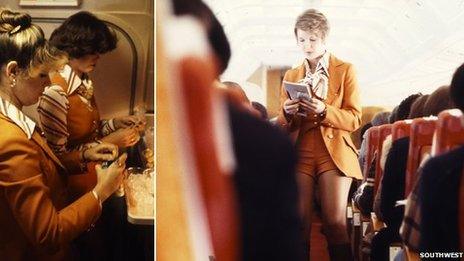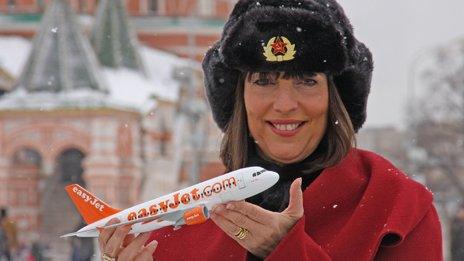Ryanair and Easyjet: The history of the peanut airlines
- Published

Ryanair used to be known for its customer service, before Michael O'Leary revolutionised the airline
If you had to think of an airline which would spare no expense to make its passengers happy, Ryanair might not be the first that came to mind.
Indeed, as its director of customer service, Caroline Green, cheerfully admits, "we're the airline everyone loves to hate".
It wasn't always like that. Once, if a flight was delayed, Ryanair could be relied upon to hand out free food and drink. It was "like feeding time at the zoo," says Charlie Clifton, one of its early staff who had risen to be director of ground operations by the time he left in 2002.
Passengers who weren't even on delayed flights, or were flying on other airlines took advantage of Ryanair's generosity, says Clifton. "It was ultimate customer focus from start to finish."
'Close it down'
Ryanair showed such generosity only in its infancy back in the late 1980s - and could ill afford to do so.
Staff and customers were happy, but the airline was losing millions. In 1988, today's chief executive, Michael O'Leary, an accountant by training, was sent by the airline's founder, Tony Ryan, to try to save some of his cash.
O'Leary concluded that the airline was "a bottomless pit" for Ryan's money, and recommended closing it down. Ryan stubbornly refused.

The UK's biggest low-cost airlines took their inspiration from Southwest Airlines
To turn Ryanair into the profit-making machine it is today required strict discipline, together with inspiration from the United States.
In the early 1990s, Ryan sent O'Leary to Texas to find out how Southwest Airlines, an upstart that was taking advantage of aviation deregulation, was making profits with lower fares.
Southwest was one of a new generation of airlines undercutting their established rivals by doing away with the 'frills'. They only served snacks on board instead of full meals, for instance, hence the nickname peanut airlines.
Southwest scheduled its planes and its staff for more flights each day, and it flew to smaller airports where it could negotiate cheaper landing charges. When O'Leary saw how Southwest was making money, it was a "road to Damascus moment," he says, "it was blatantly obvious that this was the way forward."
Important extras
Stelios: 'I took some outrageous risks'
That wasn't the end of Southwest's influence on Europe's new low-cost airlines. A couple of years after O'Leary, in 1994, Easyjet's founder, Sir Stelios Haji-Ioannou, then just 28, also went to study Southwest.
Sir Stelios added some of his own innovations to Southwest's low-cost mix. In retrospect, he says he was lucky he'd never worked in an airline: "I didn't know what I was doing." The initial investment came from his shipping tycoon dad.
It was a chance to prove himself, he says. "And of course, it wasn't a guaranteed success. Maybe it wouldn't have worked. It would have been very embarrassing to go back and say 'Dad, I've lost it all'."
Sir Stelios took some risks with his new business, cutting out the travel agents' fee by getting customers to book direct, through his own call centre. When the internet came along, both Easyjet and Ryanair were ready to take direct bookings online, which gave them the chance to offer hotels, car hire and other products to help boost profit margins.
Today, O'Leary sees these ancillary sales as key to the future of the business. He says he wants to work towards ever cheaper fares, with the revenue being made up by the "extras" that passengers are sold. It's a bit like the Las Vegas casino hotels, he says, where hotel room rates are minimal, but customers spend their money at the gaming tables.
New directions
new Ryanair
At Ryanair, cost-cutting culture has been taken to an extreme that Southwest never practised. O'Leary says he bans the buying of biros for the office at Ryanair. "Hotels are great companies that offer free biros," says O'Leary, "so I regularly purloin my biros and pens... and I'm happy to supply hotel pens whenever I can."
Customer service director Caroline Green says this isn't just another piece of O'Leary spin designed to get a bit of free publicity. "That one is true. Wherever we go, every piece of stationery is taken from the meeting room. It's just a corporate culture now."
According to former manager Charlie Clifton, representatives of Southwest who visited Ryanair's office in Dublin were shocked to see how the airline worked.
"Southwest would never have dreamed of doing the stuff we were doing," says Clifton. And when it came to Ryanair's attitude to customer care, such as a row about providing wheelchairs to passengers, for instance, "Southwest nearly had a seizure about some of our policies. They could never have applied them in the States."
The two airlines have evolved the Southwest formula in different directions.
Ryanair's senior management is unapologetic about the relentless focus on costs: "We cannot offer low fares without having a really low-cost base," says chief financial officer, Howard Millar. "So if that means we have to get up in the morning and have a fight with everybody, we will."
For Easyjet, however, price is just part of the package: the airline has introduced some things previously associated with full-service airlines, such as allocated seats.

Easyjet's chief executive Carolyn McCall has a different view of the meaning of "low cost"
The airline still follows the low-cost model, insists its chief executive Carolyn McCall. But she makes a distinction between what's going on behind the scenes and what the customer sees.
"The image of a low-cost airline continues to be that it's just very cheap." But McCall says there's a gap between that perception and "what we really are, which is low fares, very convenient, and good service".
Those diverging approaches both seem to work. Earlier this year, Ryanair placed an order with Boeing for up to 175 new aircraft and this week Easyjet announced a plan to order up to 135 new planes from Airbus.
As for Sir Stelios, he's happy to report that his initial investment of a few millions in Easyjet is now worth about a billion pounds. Not bad for someone who knew nothing about aviation.
Flights and Fights: Inside the Low Cost Airlines, will be broadcast on BBC Two on Thursday 20 June at 21:00BST.